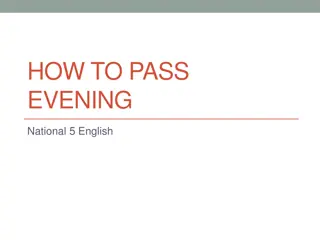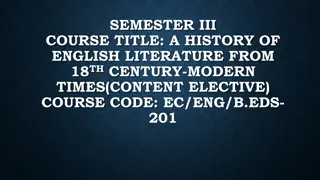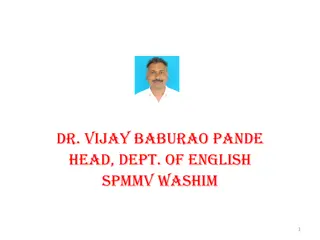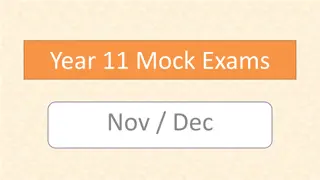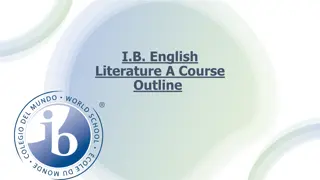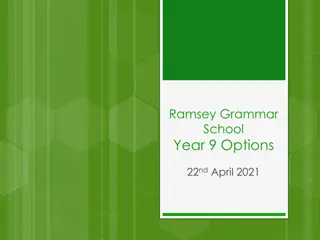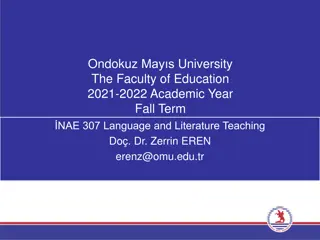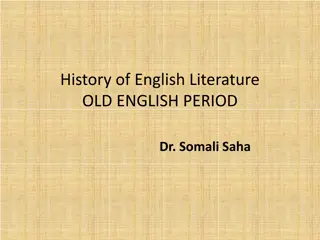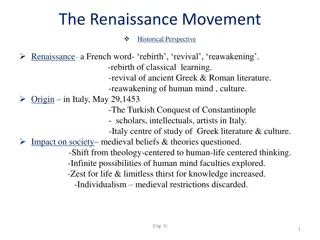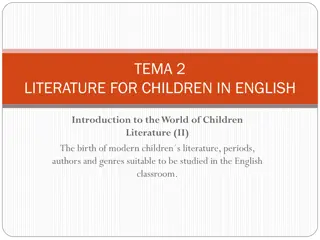English Literature Course Overview and Assessment
English Literature course covers love through the ages, Shakespeare, WW1 literature, and independent critical study. The assessment includes exams and coursework to develop written, communication, and analytical skills. Supporting activities include theatre trips, research projects, and revision classes.
Uploaded on Sep 08, 2024 | 1 Views
Download Presentation

Please find below an Image/Link to download the presentation.
The content on the website is provided AS IS for your information and personal use only. It may not be sold, licensed, or shared on other websites without obtaining consent from the author.If you encounter any issues during the download, it is possible that the publisher has removed the file from their server.
You are allowed to download the files provided on this website for personal or commercial use, subject to the condition that they are used lawfully. All files are the property of their respective owners.
The content on the website is provided AS IS for your information and personal use only. It may not be sold, licensed, or shared on other websites without obtaining consent from the author.
E N D
Presentation Transcript
Induction 2021
In your groups, make up a definition of Sociology. What is ENGLISH LITERATURE?
Course Content Paper 1: Love through the ages: Shakespeare and poetry 40% of A-level (Written exam: 3 hours Open book in section C only) Section A (25 marks) Shakespeare: one passage based question with linked essay Section B (25 marks) Unseen poetry: compulsory essay question on two unseen poems Section C (25 marks) Comparing texts: one essay question linking two texts Paper 2: WW1 and its aftermath 40% of A-level (Written exam: 2 hours 30 minutes Open book) Section A (25 marks) Set texts: Regeneration: One essay question Section B (25 marks) Contextual linking One compulsory question on an unseen extract One essay question linking two texts 20% of A-level (25 marks) Non-exam assessment: independent critical study: texts across time NEA
Literature? What are we going to cover? English Literature gives you all round skills that can be applied to different careers. Novels Plays Poetry Critical reading Independent research leading to an essay based on two texts and a theme of your choice (this is worth 20%) of you re A-Level. Mock examinations These skills include: Written, communication and strong analytical skills. Understanding complex ideas and theories.
Literature? Assessment English Literature gives you all round skills that can be applied to different careers. Terminal Assessment (end of year 13 no AS level) 80% examination 20% coursework Linear No AS component Two exam papers (one based on Love through the Ages, one based on the literature of WW1) These skills include: Written, communication and strong analytical skills. Understanding complex ideas and theories. Regular assessment within lessons through: Timed essays Additional reading Presentations
Supporting Activities Trips to the theatre (we saw Our Boy Jack and Othello very recently) Trip to the Imperial War Museum (we try and organise a trip every year) University trips to explore how English is taught at this level Mini research projects Intervention sessions for those needing extra support Revision classes towards the final exam
Student Voice There is a positive learning atmosphere in my English Literature lessons. The teachers are very encouraging and passionate about their lessons which encourages me to try as hard as I can. There is a safe atmosphere which is fun and allows every student to put forward their ideas without fear. I enjoy every aspect of my English literature classes; being one of my favourite subjects I am always being pushed to do my best. Feedback is always given with improvements to be made along with a dirt criteria I have to follow. The lesson is always engaging and we are always doing something I find useful. We do a variety of group work as well as individual tasks which furthers our knowledge and understanding as a whole. The shared reading in class really engages me and allows me to gain confidence and get on well with others, a skill I didn't possess before. I enjoy everything.
Expectations Arriving prepared for the lesson (handout, equipment, readings and questioning done) 5 hours of work per subject per week Completing homework Additional reading critical opinion of texts studied Acting on feedback (choosing to re-write essays that have generated low marks + DIRT) Revision this subject is 80% examination so this is an ongoing process! Taking an interest in how Literature is portrayed in the world, look for plays which are being staged and could be of interest to our studies.
Transferable skills from KS4/GCSE Analysis Essay writing Revision skills
Activity 1: Poetry Exploration of a poem: Read the following poem The Ruined Maid by Thomas Hardy "O 'Melia, my dear, this does everything crown! Who could have supposed I should meet you in Town? And whence such fair garments, such prosperi-ty?" - "O didn't you know I'd been ruined?" said she. - "You left us in tatters, without shoes or socks, Tired of digging potatoes, and spudding up docks; And now you've gay bracelets and bright feathers three!" - "Yes: that's how we dress when we're ruined," said she. - "At home in the barton you said thee' and thou,' And thik oon,' and theas oon,' and t'other'; but now Your talking quite fits 'ee for high compa-ny!" - "Some polish is gained with one's ruin," said she. - "Your hands were like paws then, your face blue and bleak But now I'm bewitched by your delicate cheek, And your little gloves fit as on any la-dy!" - "We never do work when we're ruined," said she. - "You used to call home-life a hag-ridden dream, And you'd sigh, and you'd sock; but at present you seem To know not of megrims or melancho-ly!" - "True. One's pretty lively when ruined," said she. - "I wish I had feathers, a fine sweeping gown, And a delicate face, and could strut about Town!" - "My dear - a raw country girl, such as you be, Cannot quite expect that. You ain't ruined," said she.
Activity 2: Poetry Exploration of a poem: Find and explore a poem of your choice by one of the following poets. Annotate a copy of the poem, fully identifying any of poetic and linguistic techniques you have studied previously. In 150 words summarise your own ideas about the themes and ideas of the poem. (30 mins) Alfred Lord Tennyson William Wordsworth T Thomas Hardy Rupert Brooke Dylan Thomas Philip Larkin Percy Bysshe Shelley Raymond Carver Robert Frost William Blake William Shakespeare
Activity 3: Research Choose ONE of the topics below and research using the bullet points to help you. Keep a record of your notes Topic 1: Gender (women) In the early part of the twentieth century, what was the status of women? How were they treated by men, their families, the rest of society? What were the battles women have fought over the last century? What, in general terms was their purpose? What were their goals? Consider your perception of the current situation? How have attitudes to women changed? How do women think about themselves? Does society treat women and men differently? Topic 2: Gender (homosexuality) In 1900 how, in general terms, was homosexuality treated by society? Give examples of evidence to prove your views. When did homosexuality between men stop being a criminal offence? What battles have supporters of homosexuality fought? What means have they used to try and raise awareness of their cause? What is your perception of the current situation? How is homosexuality treated by society generally or particular sections of society? Is there a difference in attitude towards male and female homosexuality? Topic 3: Class What does the term class mean? How would you roughly divide British society in class terms? How would you stereotypically identify the different classes? What advantages does the upper class have? In 1900, how was the importance of class different to how it is now? In what ways was this evident? .
Summer Task Read the following poem by Phillip Larkin and complete the tasks that follow: An Arundel Tomb by Philip Larkin Side by side, their faces blurred, They would not think to lie so long. The earl and countess lie in stone, Such faithfulness in effigy Their proper habits vaguely shown Was just a detail friends would see: As jointed armour, stiffened pleat, A sculptor s sweet commissioned grace And that faint hint of the absurd Thrown off in helping to prolong The little dogs under their feet. The Latin names around the base. Such plainness of the pre baroque They would not guess how early in Hardly involves the eye, until Their supine stationary voyage It meets his left hand gauntlet, still The air would change to soundless damage, Clasped empty in the other; and Turn the old tenantry away; One sees, with a sharp tender shock, How soon succeeding eyes begin His hand withdrawn, holding her hand. To look, not read. Rigidly they
Summer Task (cont.) Persisted, linked, through lengths and breadths Time has transfigured them into Of time. Snow fell, undated. Light Untruth. The stone fidelity Each summer thronged the glass. A bright They hardly meant has come to be Litter of birdcalls strewed the same Their final blazon, and to prove Bone riddled ground. And up the paths Our almost instinct almost true: Larkin was inspired by this tomb. What will survive of us is love. The endless altered people came, (cont. on next slide) Washing at their identity. Now, helpless in the hollow of An unarmorial age, a trough Of smoke in slow suspended skeins Above their scrap of history, Only an attitude remains:
Research 1. Why did Larkin write this poem? 2. Find and read two other poems by Larkin, can you see any common themes, ideas or images that he often uses? 3. Annotate the poem for language, structure and ideas. Ensure you identify how the theme of love is explored and developed in the poem. 4. Is the poem just about a tomb? What might the real meanings be? 5. In an typed essay of around 750 words, answer the following question: How does Larkin present love in this poem? (Optional Stretch how does this compare to his presentation of love in other poems?) Please bring this completed work to your first lesson.


